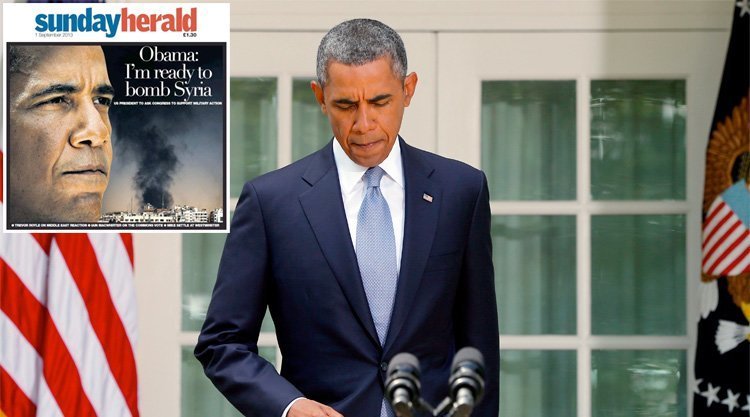
«I en tale 31. august 2013 ba president Barack Obama Kongressen om å autorisere en direkte amerikansk militæraksjon mot Syria. 4. september ga utenrikskomiteen i Senatet sin enstemmige godkjennelse. I likhet med de fleste andre trodde jeg at det var bare timer eller kanskje dager før Tomahawk-raketter ville regne over Damaskus. Men så skjedde det ikke. Hvorfor trakk USA seg i siste øyeblikk? Var vi på randen av en storkrig?» Dette skrev jeg i oktober 2013.
Bak kullissene foregikk det en styrkeoppbygging i Middelhavet som verden knapt har stt maken til etter 2. verdenskrig. Main Stream Media var klare med sin krigspropaganda, slik som på dette omslaget av The Economist. Men så i siste øyeblikk trakk Obama seg. Hva skjedde på veien til Damaskus?
CIA-veteranen Ray McGovern er blitt intervjuet i Salon, og han har sin forklaring på dette. Ray McGovern var en av toppanalytikerne i CIA. Hans karriere begynte under Kennedy og tok slutt under George H.W. Bush. Han hadde oppgaven å gi briefinger til presidenten, visepresidenten, utenriksministeren og sjefen for Joint Chiefs of Staff. I 2002 gikk han ut offentlig mot planene til George W. Bush om å gå til krig mot Irak, og han var med på å starte Veteran Intelligence Professionals for Sanity.
Derfor kan det være nyttig å høre hans versjon. (Dessuten er det et artig intervju.)
The Russians bailed out Obama when he was about to get involved in an open war with Syria at the end of August 2013 and the very beginning of September. [when Obama invoked his “red line” over the use of chemical weapons]. Now, there are a couple of things that saved the world from war at the time, but the Russian role was key. Putin and Obama had met at a summit in Northern Ireland a couple of months before, and Putin had said, “Look, we can help you on Syria. We’ve got real influence there. Let’s talk about these things. As a matter of fact, you’re worried about chemical weapons usage there? Let’s get technical experts together and maybe we can work out something.”
What happens? On the 21st of August, 2013, there is a sarin gas attack outside Damascus. On the 30th John Kerry gets up and he’s up before the State Department and says—35 times, you can count them, “It was Bashar al-Assad’s government. Bashar al-Assad did these chemical attacks and we have to get him because the president said that we would if he crossed the red line on the use of chemical weapons.”
That’s the 30th of August. On the 31st, the president has a news conference in the Rose Garden, and about 500 people, including myself, are out in front of the White House with signs saying “No Strike!” and “Don’t bomb Syria!” We were making such a din that the president’s news conference was delayed for 45 minutes. So he finally comes out, and we were fully expecting the worst. But we get word: He’s not going to attack Syria! I was the next speaker up, and I couldn’t believe it. So I said, “If this rumor is true…”
The president had changed his mind—overnight. I think I know how it happened. General Dempsey [Martin Dempsey, chairman of the joint chiefs of staff at this time], who had by then gotten not only a memo from us saying, “You promised. You testified before Congress that if you were ordered to start another war that you wouldn’t do it because it’s against the Constitution. We hold you to that promise and expect you to resign if you’re asked to.” I’m not sure we had much influence, but the British had gotten a sample of that sarin gas and realized, “My god, this isn’t the sarin in Syrian government stock.” It was homemade stuff. So they told Dempsey.
Verdens skjebne lå i vektskåla de dagene i slutten av august 2013. Faren for en storkrig var mer enn overhengende. Men krigen ble unngått, og på det tidspunktet hadde fredsprisvinner Obama hatt en mulighet til å stoppe hele den forferdelige intervensjonskrigen i Syria. I stedet lot han den fortsette, med de enorme menneskelige lidelsene og materielle tapene som vi kjenner til.


 oss 100 kroner!
oss 100 kroner!